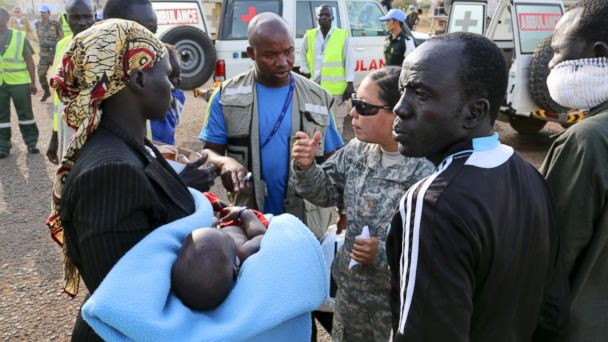Trapped American Relief Workers Flown Out of Violence-Torn City in South Sudan

(Credit: UNMISS/AP Photo)
American relief workers trapped in Bor, South Sudan, were evacuated Sunday aboard United Nations helicopters that took them to the capital city of Juba.
Three U.S. military aircraft sent to evacuate the Americans from Bor on Saturday came under small arms fire from undetermined forces, forcing the mission to be aborted. Four U.S. military service members aboard were injured by the fire.
"This morning, the United States - in coordination with the United Nations and in consultation with the South Sudanese government - safely evacuated American citizens from Bor, South Sudan," State Department spokeswoman Jen Psaki said in a statement released Sunday.
Psaki said that an unspecified number of Americans and citizens from other partner nations "were flown from Bor to Juba on U.N. and U.S. civilian helicopters." In light of Saturday's incident, Psaki said that both the United States and the United Nations "took steps to ensure fighting factions were aware these flights were a humanitarian mission."
Violence broke out earlier this week between rival factions of South Sudan's military, and there is concern that the violence could become a full-blown civil war. Hundreds have been killed in the fighting, which has mainly taken place in the capital city of Juba. Bor, in the eastern state of Jonglei, has also seen heavy violence and is reportedly controlled by the military faction not loyal to the government.
The Americans in Bor were transported out aboard flights organized by the United Nations to evacuate its civilian staff from the area, where as many as 15,000 have sought refuge from the fighting at the U.N. compound.
The United Nations Mission in South Sudan said Sunday that they were relocating their non-essential staff from Juba to Uganda and would beef up its military peacekeeper presence in Bor as part of their commitment to protect the civilian population.
"We are not abandoning South Sudan. We are here to stay, and will carry on in our collective resolve to work with and for the people of South Sudan," said Hilde F. Johnson, the Special Representative of the UN Secretary-General for South Sudan. "To anyone who wants to threaten us, attack us or put obstacles in our way, our message remains loud and clear: we will not be intimidated."
Overall the State Department has evacuated 380 Americans and 300 other foreign nationals out of South Sudan, which has erupted in violence over the past weeks as two military factions struggle for power. The Americans have been transported out on four military flights and five military aircraft.
Psaki urged any Americans in South Sudan to "depart immediately" and encouraged them to remain in contact with the U.S. embassy in the capital city of Juba.
"The U.S. government is doing everything possible to ensure the safety and security of United States citizens in South Sudan," Psaki said. "We are working with our allies around the world to connect with and evacuate U.S. citizens as quickly and safely as possible. For their safety and security, we will not outline specific evacuation plans."
On Saturday, the State Department declined to answer how many Americans in Bor were to have been evacuated by the American Osprey aircraft, citing ongoing concerns for their safety.
The Ospreys took ground fire on Saturday as they approached a landing site where the Americans had gathered. U.N. Mission to South Sudan spokesman Jose Contreras confirmed to ABC News that a U.N. helicopter conducting an evacuation mission in the nearby town of Yuai on Friday also took small arms fire. All the crew and passengers aboard the helicopter were able to return safely to a U.N. base.
On Monday, two U.S. military C-130 aircraft evacuated 120 American and western diplomats from Juba after the State Department requested U.S. military assistance in evacuating non-emergency personnel.
The planes also carried in 45 members of the U.S. military's East Africa Response Force (EARF) to stay behind in Juba to protect the U.S. embassy and the American diplomats who remained behind.
The EARF is one of two U.S. military quick response forces for Africa established after the Benghazi consulate attack. The response force of 500 Marines based in Spain can respond to crises in North and West Africa, the smaller 100 man EARF is based in Djibouti and can respond to emergency situations in eastern Africa.
Just this week the U.S. military was wrapping up an airlift mission to the neighboring Central African Republic that is also in the middle of a violent crisis. For the last two weeks two U.S. Air Force C-17 aircraft had transported more than 800 Burundian troops and their equipment to assist with peacekeeping efforts there.
South Sudan is the world's newest country after breaking away from Sudan in 2011. The United States has provided almost $1 billion worth of foreign aid to help the new country establish infrastructure it sorely needs.